“There’s nothing that cleanses your soul like getting the hell kicked out of you.”
Woody Hayes
As I was scrolling through quotes to begin my blog post, I laughed out loud when I read this one. We got the hell kicked out of us on what should have been a pleasant and easy passage. It took us totally by surprise. Being blindsided is the worst. I had blissful expectations, then, one of our worst nightmares came true.
We’ve had many successes on this voyage. We’ve also had many challenges. It took one last tumultuous event for me to reach a critical juncture. The best way to describe this transformation is acceptance. Acceptance is the first step in overcoming any misfortune. Hand in hand with acceptance learning to meet obstacles with gratitude.
Why might you ask would you ever look at an obstacle with gratitude? This is a two-fold answer. One, the greater the obstacle, the more glory there is in overcoming it. Second, when you realize you can survive these obstacles, your perception begins to shift. Resistance begins to lose its power. Confidence takes over. Damaged people can be very powerful – they know they are more than their scars.
The Best Prepared Passage
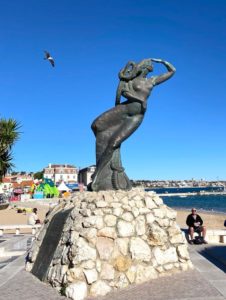
I have a beautiful new freezer. I cooked several dinners and froze them for easy dinners during our short, 4-day crossing. We provisioned our vessel for at least 3 months. With all the uncertainly about ports being closed, the availability of stores and food as we traveled towards Africa and the Canary Islands, I wanted to be fully prepared and self-sufficient for an extended period of time.
We had the luxury of time as we don’t have to cross the Atlantic to the Virgin Islands until mid-December. This gave us leeway to visit Madeira Islands and possibly Morrocco before staging in the Canaries for a good weather window to make the crossing.
When we pulled up anchor and left Cascais, Portugal, Dan and I were ecstatic. All systems on our boat were repaired and working. Dan had been watching the weather all week. Every weather model showed moderate seas and winds in the teens. We finally had our route and plan mapped out. Our life’s dream was off of hold and all ahead full steam. There was no better feeling in the world.
Damn Those Weathermen
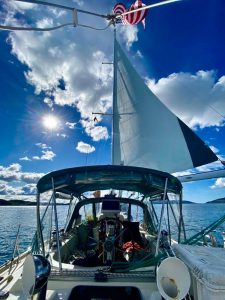
Within two hours, the swells began to rock our boat. What was such a pleasant start, quickly deteriorated. With not enough wind to fill our mainsail, each wave was knocking us over instead of being able to ride smoothly over them with sail power. Our sail quickly regressed from euphoric to miserable.
We used our satellite phone to check the weather. The predictions remained the same. The reality was quite different. I was on the edge of being seasick. I really didn’t want to go there. Dan altered the course so we could be more comfortable. It helped a little. Dotted around us, we could see several other sailboats that had also taken the good weather window to cross to Madeira. We could see them on the horizon, bobbing around like corks, also succumbing to the worsening conditions. One turned around and headed back to shore.
About 5 hours in, the wind finally built from the north instead of the northeast as predicted. It didn’t tarry in the teens. It went straight to the 20’s. Our boat is well-equipped to handle wind in the 20’s. Our 1,000-mile passage from the Azores to Ireland the wind was in the 30’s and it was wonderful. It’s all about direction though. Instead of an invigoration downwind wing and wing run (main on one side, jib on the other) we were now on a broad reach.
We had too much sail up for a broad reach, an easy adjustment for us as we have an in-mast furling system. All we have to do to take in a portion of the mainsail is pull a few lines from the safety of our cockpit. The next step to reducing our sail area is to take in the jib and put out our much smaller staysail. This certainly was not the pleasant passage that had been predicted, but we know how to adjust our sails to steer the course. 13,000 miles have passed under our hull with Dan at the helm.
How Quickly Things Change
If Dan could have changed one thing about our boat when we made the purchase 5 years ago, it would have been a hank-on mainsail. We knew there were fewer issues with a main that you pull up and down, rather than a rolling furled in-mast main that requires mechanics rather than manpower.
It was beyond our budget to make the change so we went with it. I always feared the day it would jamb and wondered how we would deal with the issue. Then, it happened one day a couple years back in the Virgin Islands. There were high winds in the Virgin Gorda that day. We pulled up anchor and set the sail. We were overpowered immediately. It was a quick fix to pull her back in and reduce the sail area.
The problem was, she was stuck, fully out, and refused to roll back into the mast. Dan yelled for me to point the boat into the wind as he raced out on deck and went through the process of lowering the sail by hand. The sail flapped and protested, but he prevailed. We dragged the huge beast down into the cabin and sailed with ease using just the jib back to St. Thomas.
It took a week, but Dan was able to repair the roller furler. I felt the event was a blessing in disguise. This is an example of how adversity was actually a blessing. It gave me confidence that if the furler ever failed, we could pull the sail down and everything would be ok. The system worked just fine for the next couple of years. We loved not having to go out on the deck in bad weather to reef our main.
In our current situation, as the wind and waves were building quickly, Dan gave the orders to reef the main. I released the outhaul that would allow the sail to ease back into the mast. Dan ran the furling line around the winch and began to crank.
Nothing happened. The main remained stretched out in full glory, refusing to budge. My heart sank. Fortunately, we had experienced this scenario, trained for this moment. Granted, we were not in the balmy Caribbean Ocean, a few miles from shore. We were 15 hours from land, darkness setting in, wind and waves becoming increasingly unfriendly.
I screamed at Dan to put on his harness and safety lines. He was already in the process as we both knew he would have to go out on deck and try to pull the main down by hand. The waves were breaking over the bow at this point, the boat pounding over 6 ft. waves. His job would not be easy. Dan tethered himself to the safety jack lines and set out to take down the main. My job was to keep the boat steered into the wind and waves. If the boat turned broadside to these waves, it could be disastrous.
I gripped the wheel and took deep breaths. Dan is extremely competent in adverse conditions. We had actually faced worse when he had to go out on the deck and cut our dinghy free after 20-foot waves ripped it off the deck and through our lifelines.
As we all know, when it rains it pours. It wasn’t enough the weather was not as predicted and the furler had failed. Despite Dan’s superhuman efforts, the sail would not come down. Somewhere inside the mast, the furling mechanism had sheered in half. Unbeknownst to us, the sharp piece left inside the mast created a stopping point and was preventing the sail from being lowered. There it hung, 3/4 of the way up the mast, flapping like an angry beast.
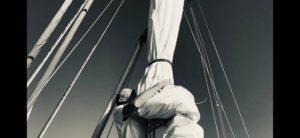
As I was concentrating on keeping the boat steady using the power of our engine, I heard a screeching coming from the cabin, specifically the engine room. I’ve heard that squeal before. It was the fan belt. When it becomes loose it makes that sound. When it makes that sound, it sometimes breaks. Dan has replacements and it’s an easy fix; but not when you are wresting in the mainsail and bouncing through unrelenting waves.
My first reaction was to instantly throttle down the engine. The squealing stopped. Unfortunately, I didn’t have the power to make any progress into the wind. I steered into the wind, but the rudder didn’t respond. The boat began to drift sideways into the waves.
I saw a wave crash, and Dan, with a handful of flapping main, got slammed into the metal shrouds. I heard him screaming to keep the boat into the wind. I couldn’t communicate with him that the engine was about to stop if I revved the engine back up and the belt broke. I didn’t know what to do.
I increased the RPMs and got the boat back on course. The belt screamed below in protest. I screamed back, “Deal with it!” but throttled back just enough to keep us in the right direction. Our boat speed was varying between 1.2 and 1.6 knots which was barely moving, but it seemed to be working. When I looked out at the waves beside us, it seemed we were actually going backward. We may have been doing 1.2 in reverse…
The next half hour or so seemed like an eternity. Darkness was descending like a shroud. Dan was grabbing every line he could reach, wrapping his arms around and taming a section of sail, then lashing it to the mast or boom. I could tell his hands were getting ripped to shreds as lines and sail whipped against him. He would lose his grip on a line and then have to recapture it as it flailed violently in the wind. The gusts were now reaching 25 knots.
Searching for one more line to wrap up the main, Dan unhooked the last halyard that was secure to the top of the mast but reaches down to the deck. We use it for hauling our dingy into the water, for the spinnaker, and hoisting ourselves up and down the mast. He managed to open the clip and free it. Then, a big wave hit. We lurched sideways and Dan had to grasp something to keep his balance. The halyard now free, whipped into a frenzy and straight to the top of the mast.
This would not be a deal-breaker except for the fact that it was now wrapped around our furled staysail and foiled our ability to roll it out. We were now down full power on our engine, our mainsail, and our storm jib. Darkness was now upon us. Things were not looking good.
As soon as Dan returned to the cockpit, he grabbed the helm and set us back on a broad reach with just the jib. Still overpowered, we reefed it by rolling it in halfway. Other than the bouncing over the waves, things got eerily quiet. The sound of the main flapping had been deafening, creating auditory discomfort to the tumultuous situation. The boat settled into a steady but uncomfortable rhythm, heading deeper into the heart of the dark ocean.
Change of Course
Always the stoic and unflappable captain, when I asked if we could turn around, Dan initially said, “No, we are fine, we will continue.” I was not looking forward to three more days of this weather, the boat rolling side to side, a miserable motion that had me as green to the gills as possible without vomiting. This was as far as you could get from the passage I had imagined and I couldn’t foresee anything getting better.
That’s about the time our radio crackled to life. I heard bits and pieces of a conversation, mostly from Marine Rescue trying to obtain more information. A boat in our vicinity had put out a distress call. While we were battling our own demons, their demon had won the fight. It’s a sobering moment to know there is someone out there in the dark, struggling for their lives. Sure, we had to work through issues, but we were certainly in no danger of sinking. I sent out prayers for that vessel and a few more for our safety.
It was around 4 in the morning. We didn’t have dinner as even looking at food would have made me sick. Neither one of us could sleep. Dan’s adrenaline finally ebbed and exhaustion took over. He asked me if it was okay that we changed course to Lagos, Portugal. It was about 20 hours back in the direction from which we had sailed.
I thought for a moment. Hmmm. Three more days of this or 20 hours back the way we came? I voted immediately for a change of course. Dan’s reasoning didn’t have to do so much with our comfort level. He began to think about repair options and how they might be limited in the tiny Madeira islands. We needed our mainsail fixed to continue our journey. We know Lagos well. There was everything there we needed to get our boat fixed.
We sailed into the dawn in a new direction. I had time to contemplate the events. I felt that something inside of me broke along with the main’s roller furler. We alternated taking naps to try and recoup our lost sleep. The wind and waves remained the same the entire day. It wasn’t a pleasant sail with just the jib, but we were making five to six knots without the engine. Dan easily tightened the fan belt for when we needed to use the engine.
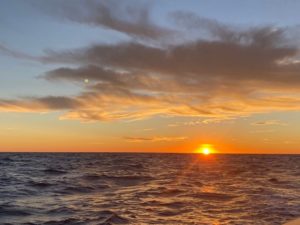
There is a certain phenomenon that occurs every time we pull into a harbor to anchor. This night was no exception. As we neared the shoreline, the winds instantly picked up into the 20s again. We can have no wind at all blowing, pull into an anchorage, and instantly have gusts in the 20s. It’s mind-boggling really. However, we are experts at anchoring so we take it all in stride.
What was different in this situation was the complete blackout. We time our arrival into a new harbor to arrive during the daylight whenever possible. With a few exceptions, we have always been able to do this. This night, we were not going to delay our arrival. Dan relied on our charts and GPS to navigate in the moonless, black night.
He described the harbor as lined with cliffs and a small beach. As we inched our way toward shore, I could hear the sound of the waves crashing. They sounded so close. I kept yelling back to Dan about the depth of the water. I was waiting for the response “20 feet!” so I could drop the anchor. We drifted closer to shore, the sound of the crashing waves escalating.
There were no other boats on our radar. The harbor was completely deserted except for us. We were relying solely on our electronics for finding a safe place to anchor as no visual was possible.
Finally, “OK, 20 ft. Drop the anchor,” the words I was holding my breath to hear. I immediately dropped the hook, calling out the length of the chain as it passed. I had a light strapped to my head so I could see the windless and anchor chain. At 100 ft. out I held up my fist, signaling we were done. Dan reversed the engine and set the anchor. He finished the job by securing a safety bridle to the anchor chain. By 11:00 pm, we were both sound asleep in a gently rocking boat, dead to the world.
Soul Cleansing
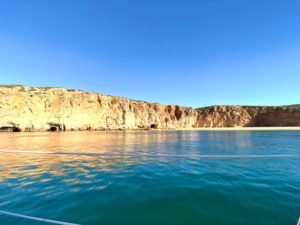
I ran up to the cockpit and looked around. The view was stunning. The cliffs, dotted with caves lined our harbor. A small spit of a white sandy beach split the bay. Waves broke gently along the shore. The sun danced in sparkles across the calm blue sea behind us. The breeze was gentle, the sun warm. I took a deep breath, totally confused as to why I was so happy.
The plan was to make the six-mile sail south to the city of Logos. There, we could anchor in the harbor next to the marina and begin the research for the repair of our mast. During the pleasant and quiet sail, I reflected on my attitude. Instead of grief or disappointment, I felt energized. I had to analyze this as my reaction to these types of situations in the past has been quite the opposite. I tend to get depressed, dejected, and it takes Dan days to dig me out of my hole of despair.
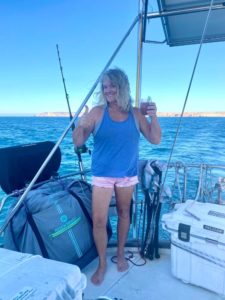
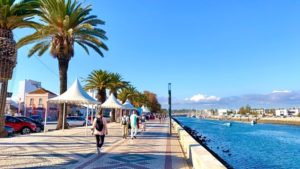
It’s unfortunate that the rigger will be out of town next week and can’t begin repairs until the following week. The good news is that he feels confident we can pull the mast off the boat, replace the broken parts, and be back in service in a couple of weeks.
If this plan works out for us, we will be able to continue to the Canary Island, then make the crossing to the Virgin Islands in December. If it doesn’t work out, we will simply adjust our course, spend the winter on this continent (or maybe even Africa), and head into the Mediterranean next summer. Anyway, however it turns out, we have learned to go with the flow and enjoy the adventures.
Good News and Bad News
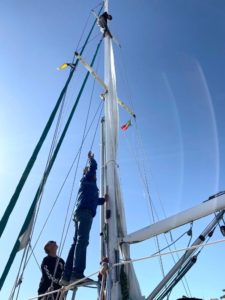
Dan and I can put the boat in a marina and work to refill our cruising kitty. It has taken a severe and unforeseeable hit having to spend two winters in a marina in Ireland because of Covid, and with all the parts we’ve had to repair and replace. We will have to forgo the holidays with our family, but it is a quick option to replace our funds.
We are hoping to survive financially until that point. I don’t know what fate, karma, the universe has in store for us, but whatever it is, we will face it head-on and with confidence that we will overcome every obstacle that stands in our way. We will use them as stepping stones to reach our goal of circumnavigating this great planet. It is our job now, and we are committed.
If you have been inspired in some small way by our stories and adventures, there is a small way you can help. We figured if we got each person who reads this blog to buy us a drink, for $10, we can finance our mast repairs.
T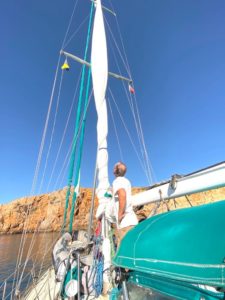
Obstacles are just those frightful things you see when you take your eyes off your goals so we will look past and find our way forward. We will keep you all updated with our progress. I’m sure there will be more stories to tell – I’m praying that they are predominantly happy.
As always, thanks for following and for all your support.
Click on the link below to buy us a drink (that really goes toward our new roller furler)!
We will make a toast to you. Leave us your email if you would like us to send you a personalized Equus Happy Hour picture.
PayPal link – BUY DAN AND ALISON A DRINK
Fair winds,
Alison and Dan
S/V Equus

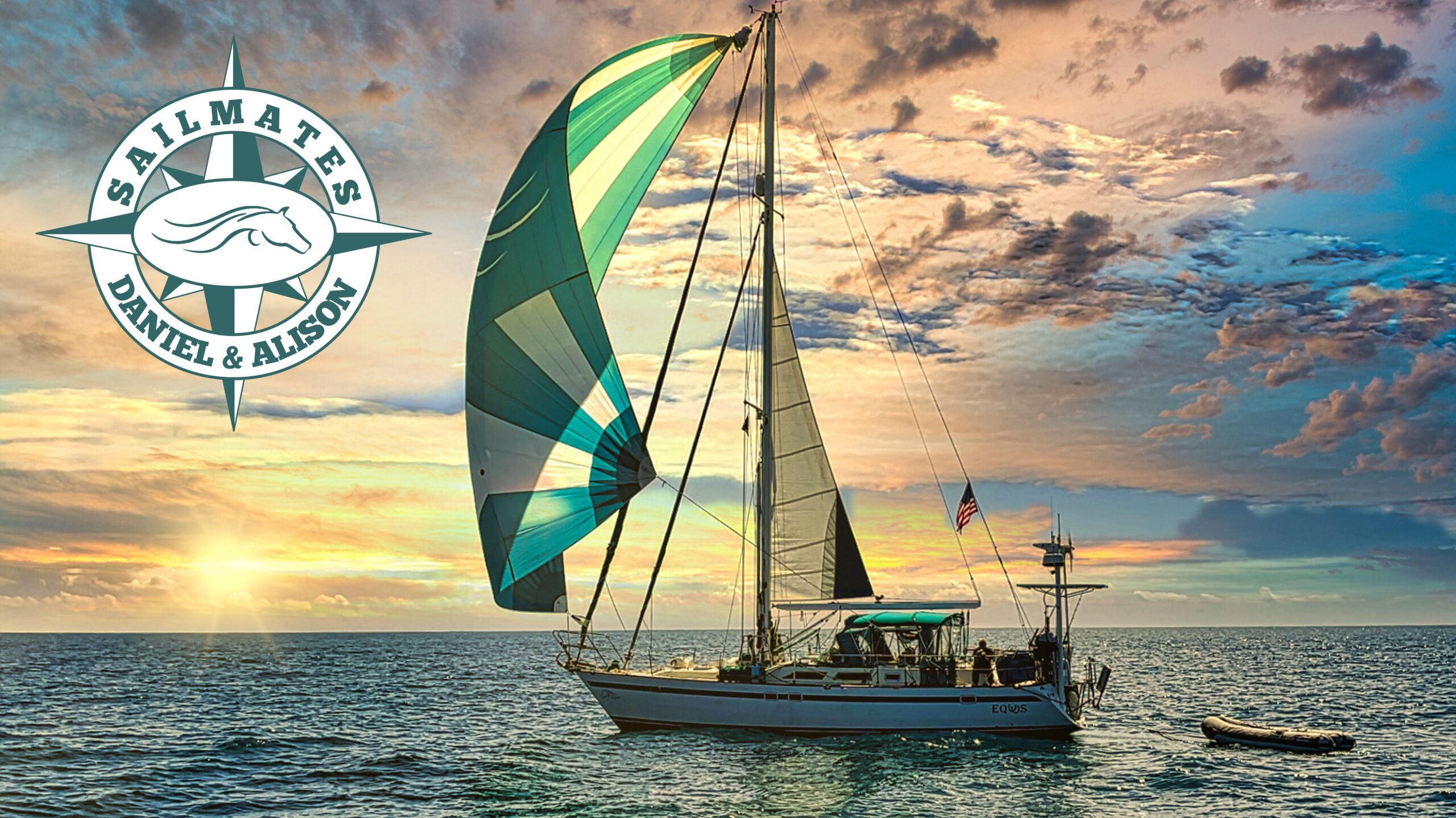
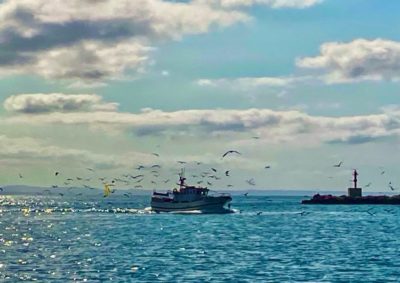
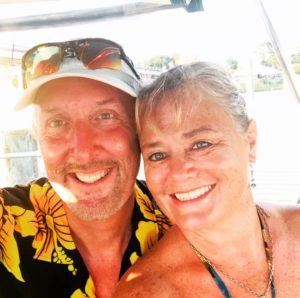
Your blog posts are SO inspiring to me, Ali – Especially this one; – knowing that both you, I & (your Champ !) have that anxiety ridden reaction to things going wrong & upset! Your take/away giave me hope & a different outlook the minute I finished reading it. Thanks for sharing this directly to me!! (Could you do that, whenever you write again?? Please?? It was nice to come home to!!
Your writing is just so beautiful- – & if not an easy sail – You managed to make this an easy read!! 👍🎈
I don’t have PayPal or Venmo – Could I ask a friend to help me w/ getting your adventure a little pump $ up?? Love you guys –
Text me –
Dan and Allison. Way to persevere. Your adventure is remarkable. Keep doing what you are meant to do.
It’s got to be the going not the getting there that is good.
After reading this I’m almost speechless. You write so well, Alison, that one feels like they are right there with you BUT at this point I’m glad I’m not!!! Love the courage & determination you both have & wish contentment & happiness when your plans fall into place. What an incredible journey! Having been to Antarctica I can picture what time there might be like for you , interesting & challenging. Think you would get SO much out of that adventure. One more story! Our admiration & love.
Thank you Sue and Carl. We had no idea you have been to Antarctica. I’m happy to hear the great review. We are excited at the prospect of spending a few months working there. I’m sure it will be an epic experience.